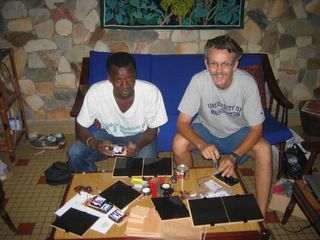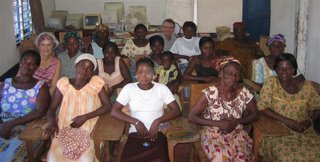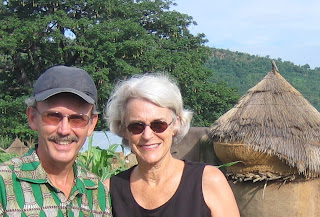Wayne has been consulting a young man in establishing a small solar energy enterprise. The individual solar panels can charge cell phones and radios and are especially useful in the many villages that do not have electricity. They are cost efficient and environmentally beneficial because the quality of batteries sold here is very low and they only last a short time. The ground is littered with old leaking batteries with which we sometimes see children playing. See photo of Wayne and Claude, the young entrepreneur, as they assemble the panels at our living room coffee table. Wayne has also been teaching computer classes to the staff of two NGOs and is presently trying to get a used computer in the town library so they can have an encyclopedia reference. A computer will draw in more people than the old books on the shelves.

Cate has written several proposals to organizations to help find funding for different events in the fight against AIDS. You will be hearing more about a Theater Festival centered around World AIDS Day on December 1st when 25 regional theater troops will perform educational skits to more than 20,000 persons in our region to inform them on the prevention and treatment of HIV/AIDS. Street theater is the traditional African way of creating community awareness, and if you have seen “The Constant Gardener” movie, the scene of the actors performing the AIDS-related skit on the street is very accurate. Cate also works with 2 NGOs who provide services to people living with HIV/AIDS in helping to maintain and justify their programs to international funders.
Together, we have been teaching Business Skills Classes to owners of small enterprises. We are using our own strengths: Wayne handles the math part, and Cate tells the stories, and together we hope we are reaching them. Business skills for small enterprises include teaching cash flow, profit and loss, selling and buying with credit (big issue in Africa), and marketing. Small enterprises include businesses and/or entrepreneurs such as tailors, hair-dressers, wood sales (for cooking), food items in a small boutique, and a small electronics store.
Togo is one of 26 countries recently listed on the World Bank list of nations at risk of political and economic collapse. Perhaps due to this “fragile state,” our biggest accomplishment may be introducing a new micro-credit system of savings and loans to the “poorest of the poor” in our community We are presently working with a group of about 20 women in Atakpamé who sell products such as yams (a staple food item here), charcoal (for cooking), tomatoes, or individual meals such as boiled grains wrapped in leaves or contained in small plastic sacks. For the most part, they walk around and sell them from big basins which they carry on top of their heads or they lay their produce out on the street where people can walk by and make purchases. Some of them rent a small space in the outdoor market. These women work hard daily, earning just enough money to feed their family and make simple provisions. With the creation of a small, informal, autonomous savings & loan association, they should be able to increase their household security through savings, have an opportunity (where otherwise impossible) for a loan either for investment in their business or other needs, and have access to a Social Fund for relief from emergencies. The unique thing about this program is that all the financial transactions take place at the meetings of the entire group when the cash box is opened by three different keyholders, providing complete transparency.
In introducing the concept to the group, we role play and present skits so that these women, who are illiterate, (not unsophisticated—just illiterate), will understand the system. Don’t let the “poorest of the poor” and “illiterate” confuse you into thinking they are not intelligent, strong and hard-working women. They are industrious, good-humored, independent, strong women, and Maya Angelou describes them well in her poem “Phenomenal Woman.”

We feel especially good, at last (work has been slow and our feelings of usefulness are not always fulfilled), that developing this concept of micro-credit savings and loan for small groups is a way for us to make a real contribution to some local Togolese people. Maybe, afterall, we can make a small difference!
If you’re still reading this, thank you for your interest and support of our life and work here. We are somewhat captivated by our African experience, but we never forget that “life goes on” in the states. We are missing the weddings, the births, confirmations and graduations—the “passages” of our family and friends. (And it’s again hard to even think about the approaching holidays). We might be having the time of our lives here, but we truly look forward to our return home in just 10 months.
Solar Cell Assembly
